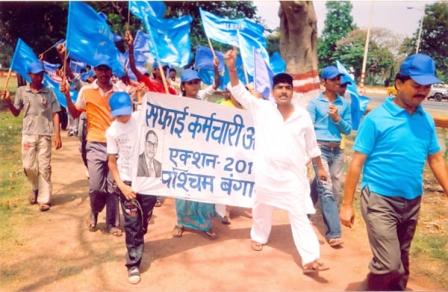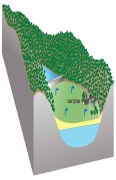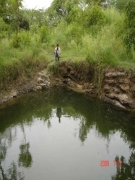Equity
Right to drinking water in India - A working paper by Centre for Economic and Social Studies
Posted on 21 Oct, 2010 10:31 PMThis working paper by Centre for Economic and Social Studies (CESS), Hyderabad deals with the issue of right to drinking water, an issue that has assumed greater significance in India in recent years. Declarations by the United Nations and other international organisations, and judic
Review of right to water: Human rights, state legislation, and civil society initiatives in India
Posted on 19 Oct, 2010 07:33 AMThis study by CISED is a review of the rights discourse in the context of water, based on academic and popular literature on rights and civil society initiatives as well as government documents regarding water and related subjects.
Construction in and around a 300 years pond which is a heritage site in West Bengal
Posted on 12 Oct, 2010 04:42 PMI, on behalf of the local people bringing to your notice that we have a 300 years-old pond in our locality which is known as Bhabani Pathak Dighi which is declared as a Historical and Heritage Site by the West Bengal Heritage Commission.It is in the City Centre area adjacent to the Ambuja Housing.
The total 8.48 arcs of pond and its surroundings (area not known) have been declared as a. A tunnel was found when a construction work was going on beside the pond and some renovation work has also been done there accordingly by West Bengal Heritage Commission (annexure no 13). Now the pond is only approx 3.5 arcs left and rest has been filled.
This awesome site has shot to fame by the novel Durgesnandini of great Bengali novelist Bankim Chattopadhyay.The novel describes the best featuring and intricacies of these tunnels and the pond.
Ramlila performed on a river, in Saharanpur after 30 years !
Posted on 12 Oct, 2010 03:22 PMSaharanpur (9 Oct) : History was created in Saharanpur once again. Today, Paondhoi had thousands of visitors (e.g.
‘Samajik Parivarthan Yatra’ (National Yatra for Social Transformation)
Posted on 11 Oct, 2010 11:51 AM The historical ‘Samajik Parivarthan Yatra’ (Rally for Social Transformation), has been started to consolidate the gains of the movement for total eradication by liberated safai karmacharis who for the first time are bonding with one another began the journey for social change together, to inspire others who are still engaged in manual scavenging to free themselves from the obnoxious practise and regain their sense of dignity, and also to achieve their rightful claims for the rehabilitation package and dignified alternative livelihoods on the one hand; and on the other, to motivate civil society to reject the heinous practice of manual scavenging. The Bus Yatra has been planned to start from five different corners of India, and traverse through 160 districts in 20 states and finally culminate in New Delhi with a large rally. Each route has been named after an eminent person who contributed to social change in a revolutionary manner.
The historical ‘Samajik Parivarthan Yatra’ (Rally for Social Transformation), has been started to consolidate the gains of the movement for total eradication by liberated safai karmacharis who for the first time are bonding with one another began the journey for social change together, to inspire others who are still engaged in manual scavenging to free themselves from the obnoxious practise and regain their sense of dignity, and also to achieve their rightful claims for the rehabilitation package and dignified alternative livelihoods on the one hand; and on the other, to motivate civil society to reject the heinous practice of manual scavenging. The Bus Yatra has been planned to start from five different corners of India, and traverse through 160 districts in 20 states and finally culminate in New Delhi with a large rally. Each route has been named after an eminent person who contributed to social change in a revolutionary manner.
Analysis of the UN General Assembly's Resolution on Right to Water and Sanitation
Posted on 30 Sep, 2010 06:47 PMThe historic UN General Assembly Resolution declaring Water and Sanitation as a Right, was passed on the 28th July 2010.
What is surprising is the complete silence to this UN Resolution from some of the countries who have been traditional champions of human rights, in terms of celebrating it as a historic achievement in advocating a basic right to water and sanitation. Instead some of them went one step short of openly opposing and vetoing the UN Resolution and have heaped criticism on Bolivia for tabling this UN Resolution.
Field experiences by Avinash Krishnamurthy, BIOME Solutions
Posted on 29 Sep, 2010 11:04 AMOne of the oldest "People's electricity" systems I have ever seen (Please read the notes for each of the videos). Of course this trip had even better high points - wine made from Gooseberry and Nutmeg - all locally brewed. So travelling in the midst of hills, sipping local wine, seeing some great work, (and providing perspectives for someone-else to write - is this work or what?
Community organisation in groundwater management – A presentation by ACWADAM
Posted on 27 Aug, 2010 04:01 PM This presentation by ACWADAM on community organization in groundwater management deals with the processes involved in people’s mobilization and participation. The requisites of groundwater management include: resource enhancement, demand management, equitable distribution, institutional mechanism and controlling of free riding. It deals with groundwater management at a local scale when compared to aquifer management.
This presentation by ACWADAM on community organization in groundwater management deals with the processes involved in people’s mobilization and participation. The requisites of groundwater management include: resource enhancement, demand management, equitable distribution, institutional mechanism and controlling of free riding. It deals with groundwater management at a local scale when compared to aquifer management.
Aquifer management involves:
- Identification of aquifer on the basis of geology;
- Identification of recharge and discharge areas;
- Assessment of aquifer capacity and yield through aquifer mapping;
- Protection of recharge area and increasing the groundwater level through artificial recharge in recharge area (based on the geology);
- Treating groundwater as a common property resource;
- Encouraging community use of groundwater and restricting individual use;
- Putting in place an institutional mechanism and legal back up for community groundwater management;
- Awareness generation regarding groundwater and science of hydrogeology.
Pani Panchayat: A model of groundwater management – A presentation by ACWADAM
Posted on 25 Aug, 2010 08:20 AM The presentation by ACWADAM deals with Pani Panchayats as a model of groundwater management.
The presentation by ACWADAM deals with Pani Panchayats as a model of groundwater management.
Pani Panchayat is the name first given to a movement by Mr. Vilasrao Salunke for motivating farmers of Naigaon village of the drought-prone Purandhar taluka of Maharashtra in 1974. The government's inability to deal with the drought situation prompted him to take a 40 acre land on lease from the village temple trust and develop a recharge pond in the recharge area of the village, a dug well in the discharge zone and a lift irrigation system.
Farmers got impressed with the results demanding a scale up of the experiment leading to the setting up of Gram Gaurav Pratisthan (GGP) through which the work was expanded to encompass both groundwater and surface water management.



